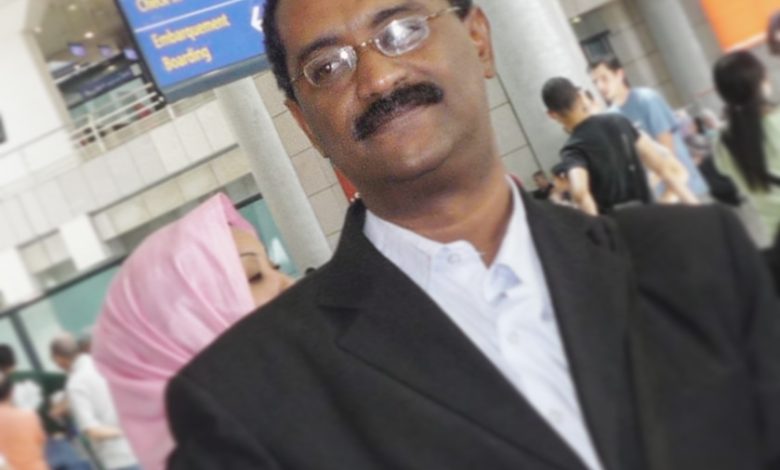Dean of the College of Music and Drama, Dr. Sayed Ahmed Ahmed: (No to war) is said before the war occurs

*The artist’s message must be free of any political propaganda
*When the artist identifies with the politician, his entire career is destroyed
Dr. Sayed Ahmed Ahmed, lecturer at the Faculty of Music and Drama (Drama Department), remained in their home in the Al-Wahah neighborhood of Omdurman throughout the war. He has not left it until now. He sees the war as a colonial project that aims to get him out of his home in the first place. Therefore, his stay became a period of contemplation, planning and thinking. During this month, he was given the deanship of the Faculty of Music and Drama, Sudan University.
In this dialogue, we will discuss the vision of Dr. Sayed Ahmed for the war scene and its analysis.
Dialogue: Magda Hassan
You are still in the war zone. What are your observations during that period, and how did you spend it? Was it an inspiring period for you?
My presence in Sudan during the war was a beautiful experience, despite the difficulties and dangers that my family and I faced. We did not leave the country even though we had no obstacles, but we preferred to be in our country and in our home because one of the most important goals of this war is to occupy our homes with the aim of a naive person who suggested to one of the parties of the conflict that all this property will belong to you, and this is what we heard and saw even before the war, so it has become a war of existence and not a war for political goals. Everyone must understand that one of the naive goals of war is the goal that I mentioned and did not imagine. Until this moment, they wish themselves to achieve the naive dream. When they were unable to achieve it, they destroyed it and stole all of its property. This is the cruelest thing in this war, and we did not imagine in our worst imaginations of the outcome of the war that this would happen.
*Was this year of war an inspiring period for you?
Yes, it is inspiring to every artist, but after a later period the results of this inspiration will appear, not now.
*How do you see the role of artists during the war?
The role of the artist is greater and deeper. The artist sees from a different perspective and feels a different feeling. He is the one who brings back the moments of life so that we can see them with his vision after he puts his treatment in order to elevate the values and beauty that exists in our lives.
*I noticed that the theater artist repeats “no to war” without presenting a vision, even an artistic one of how to stop the war?
I do not support the role of the artist who is considered to be complementary to a specific political role, despite his freedom to adopt political ideas and positions. Although, I think from a special point of view that the artist is superior to every political position and superior to every ideology. Art itself is an ideology and cannot adopt another ideology. The artist has depth in the message he directs. It must be free of any political propaganda or specific thought. The specific thought itself frames the role of the artist and he becomes an artist for whoever sees and believes.
*We note that no to war (political) is closer to being artistic. How can an artist say no to war with his tools and artistic creativity?
No to war is said before it happens not after. When you say no, what is the solution? In this case, as an artist, you must be aware and look forward to the future and be alert to the dangers of war and set your vision as an artist to say no.
**So what do you personally think about how to stop the war?
War stops when the person who reaps its benefits feels that he has reached his sufficiency. Meaning the following:
War is a state with ambitions
War is a party with goals
War is a person who dreams of power
War is a merchant who earns
War is exploited craftsmen..
War is an international community that sees what we do not see and does not feel what we feel. All of them have the power to stop the war.
*Art reflects life, but now it coincides with politics. How do we restore its role?
As I mentioned, when an artist identifies with a politician, he completely destroys his/her career, presents distorted art, and becomes closer to sycophating those in power.
*We used to hear about theater in conflict areas, but when the conflict spread to all of Sudan, theater disappeared. What is your comment?
Theater in conflict areas does not mean armed conflict in all cases. It addresses ethnic cultural and intellectual conflict. Perhaps so that there would be no armed conflict.
However, when armed conflict breaks out, theater cannot present itself in the midst of what it has not succeeded in treating.
The question is, did theater have an impact in conflict areas?
I see the answer lies in reformulating the tools of theater in conflict areas, and reviewing its themes and treatment of these themes.



